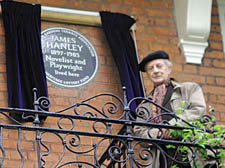|
|
 |
| |

James Hanley's son Liam next to his father's plaque |
Plaques for the memories
Public erect plaques to those snubbed by English Heritage commitee
PLAQUES marking the homes of worthy residents on a Parliament Hill estate were unveiled at the weekend as part of a scheme to take the decision of commemorative plaques away from an English Heritage quango.
Neighbours in Lissenden Gardens, off Highgate Road, raised funds to have the plaques cast by a firm who make Blue Plaques to show three homes of notable former tenants.
The Lissenden Gardens Residents and Tenants Association erected the first tribute when an English Heritage committee refused to mark the home of Royal Academy artist Anthony Green.
Residents took the matter into their own hands, and after successfully applying to a Lottery fund for cash, set about honouring Lissenden Gardens tenants.
Plaques have been put up to the Welfare State champion the historian RH Tawney, Anthony Green and composer Martin Shaw, who penned the lyrics to All Things Bright and Beautiful.
Jeffrey Morris, who originated the plan, said: “We took the matter into our own hands after being given the brush off from English Heritage. Our community feel these peoples homes are worth marking, and so we are doing it ourselves.”
Among the guests were Kate Perry, an archivist at Girton College Cambridge, and who helped unveil the plaque to Alice Zimmerm. She spoke of how Alice’s influence was still felt at the college.
She said: “There is a portrait of Alice at the college, and a coveted annual prize in her name. She came up in 1881 and was held in extremely high esteem. Her work is still much respected.”
James Hanley’s son Liam was joined by representatives from his fathers publishers while Haydn Wood’s plaque was unveiled by his great-niece and Tony Claydon from the Robert Farnon Society for British Light Music.
Haydn Wood
HAYDN Wood was a virtuoso violinist and composer, and for 11 years used his flat in Parliament Hill Mansions as the base for writing 100’s of pieces that became household numbers.
While he was also a renowned classical composer, he is best known for his lighter compositions. His work dovetailed with the beginnings of radio broadcasting and his songs, which included the First World War classic Roses of Picardy, were much whistled by his contemporaries after being played on the radio, while one of his tunes became the theme for the long-running Radio Four programme Down Your Way.
James Hanley
JAMES Hanley’s story Boy, a novel about life below decks in the merchant navy, gained notoriety when it was first published in the 1930s: censors deemed it unsuitable for popular consumption and the publishers went to court.
Hanley’s cause was trumpeted by EM Forster and he was supported by DH Lawrence and Henry Miller. Re-released this year, it has become a classic, with critics comparing Hanley’s sea stories to those of Joseph Conrad.
He lived and worked from Lissenden Gardens for many years and eventually passed away there aged 88 in 1985.
Alice Zimmern
ALICE Zimmern was one of the first residents to move into the Garden’s after they were finished in 1906. She lived there until her death in 1939.
Zimmerm was the daughter of German immigrants and became a renowned classics scholar at Girton College, Cambridge. She wrote widely and also taught, but is best known for campaigning for equal access to education for women and being a major voice in the campaign to secure universal suffrage.
|
 |
|
| |
|
 |
|